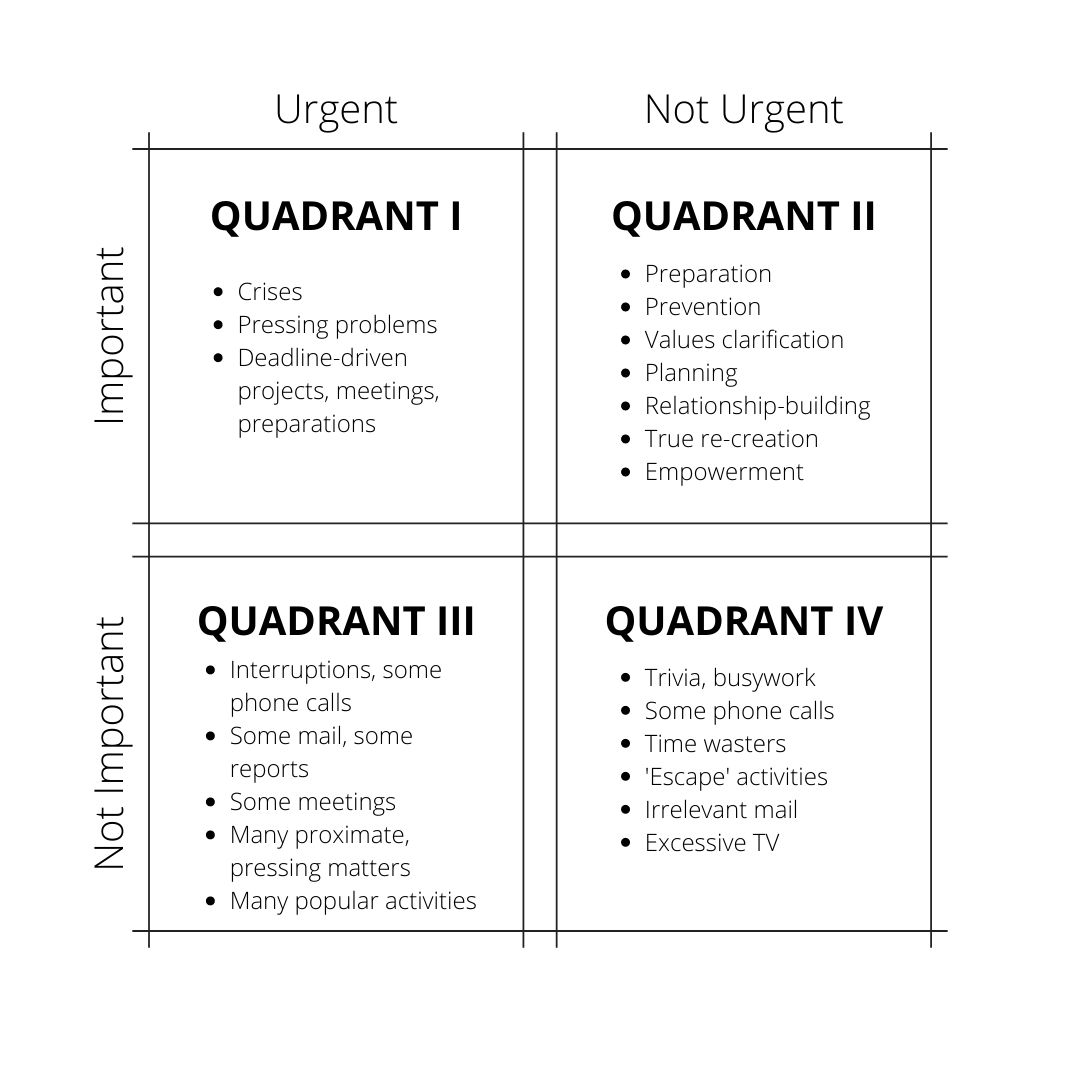As the summer months faded into fall, I once again embarked on a nearly 400-page journey to self-improvement. First Things First is a collaborative book by Stephen Covey, Roger and Rebecca Merrill, setting itself apart from all other works on the issue of time-management.
My experience while reading and applying the knowledge from this book has been surprisingly pleasant. I’ve learnt a lot about my relationship with my time and how to reduce the frustrations from not doing enough. Now, I’m going strong with nearly two months in my little planner and some colour-coded graphs that mark my progress toward my goals.
The Clock and the Compass
The very first thing addressed in this book is the misconception on what time management ought to be. You must have heard this a million times so far: ‘nowadays people are always busy’, or ‘today’s society never has enough time’. And yes, there have been numerous occasions in which I felt like the mountain of tasks ahead of me would collapse and my body would not have been found for months, buried in the avalanche of assignments, article deadlines, books to read and exams to study for. This book has got the answers to the universal race against time. Or so it claims.
Time shouldn’t be measured with a clock, but with a compass.
‘The clock represents our commitments, appointments, schedules, goals, activities (…) The compass represents our vision, values, principles, mission, conscience, direction – what we feel is important and how we lead our lives’. All that talk about how well-spent time is more valuable than rushed time.
Then the writers go on to reassure the reader that they’ve made a good choice of picking up this time management book and not another. They speak of 4 generations of time-management.
First, we have the ‘reminders’ generation. The ‘write your tasks down on post-its and hope you don’t forget anything’ generation. Some things fall between the cracks, but you are able to change things as they go. Most things don’t build up to a more substantial goal. But, oh, nothing compares to that dopamine kicking in when you check items off your list
Second, you have the ‘plan and prepare’ generation. This generation is the suit-and-tie cousin that lectures you at the family barbeque: “you’re late.” Deadlines and commitments are all centralized, either in a fancy agenda or on the computer.
Third, there is the ‘plan, prioritize and control’ generation, that asks itself the question: ‘What do I want?’ and lays out short, medium, and long-range goals accordingly. Here the planning can go gaziantep escort down to the minute, if not the second.
Lastly, there’s the generation this book belongs to. The generation that thinks it’s cooler than all the other ones because of its holistic approach. We’ll explain this later. Stay vigilant. Maybe you have recognized your style of time-management in the lines above or you are wondering what the fourth one is. Let’s skim through another important issue: the urgency addiction. that and discuss another issue in our society: the addiction of immediacy.
As someone who frequently starts assignments a few hours before their deadline (this article included), there was no surprise that I, too, am an urgency addict. What better motivator than stress, right? What better past-time than meltdowns? Well, I’m not a special snowflake, say the writers, but a product of the culture we’re living in: the all-nighter culture. I recommend you look up the Urgency Index and figure out whether you’re an addict too.
The Main Thing is to Keep the Main Thing the Main Thing
Here, we get to the nitty-gritty of planning. But first, we need to talk about the fourth generation of time-management. This entails the marriage between following our inner compass to distinguish meaningful goals for ourselves and the will to act towards these goals. Our daily or weekly izmit escort activities should reflect what we want to achieve. You can’t run a marathon without constant and persistent training. You have to prepare and plan ahead.

Our time is split into 4 quadrants by the axis of Importance and Urgency. The book suggests to limit our presence in the 3rd and 4th and increase our time and energy invested in the quadrant of important but non-urgent matters. Do you have an exam in 3 weeks? Split down the material into small chunks to be perused each week. Do you want to become a professional photographer, but also a better friend? Experiment with different techniques in photographing your friends, and you can also create some fun memories of that time you guys went out to take photos.
The important thing is to not get distracted konya escort from your big dreams and ambitions. You know what those important things are to you and what roles you fulfil in your life. So put them first!
Find what works for you and make a planner you’ll want to spend your time planning in.
The Power and Peace of Principle-Centered Living
Now, does it work?
I can only speak for myself. I’ve gone through 7 weeks of planning my life according to the principles in this book, and I’ve gained some clarity on how to spend my time wisely and nothing that goes in my planner is unimportant.
I can’t say that I’ve found my way, or that it’s all going to be smooth from now on, but the constant fear that I’m not doing or being enough isn’t as overpowering as it used to be.
Cover: Andrada Pop





